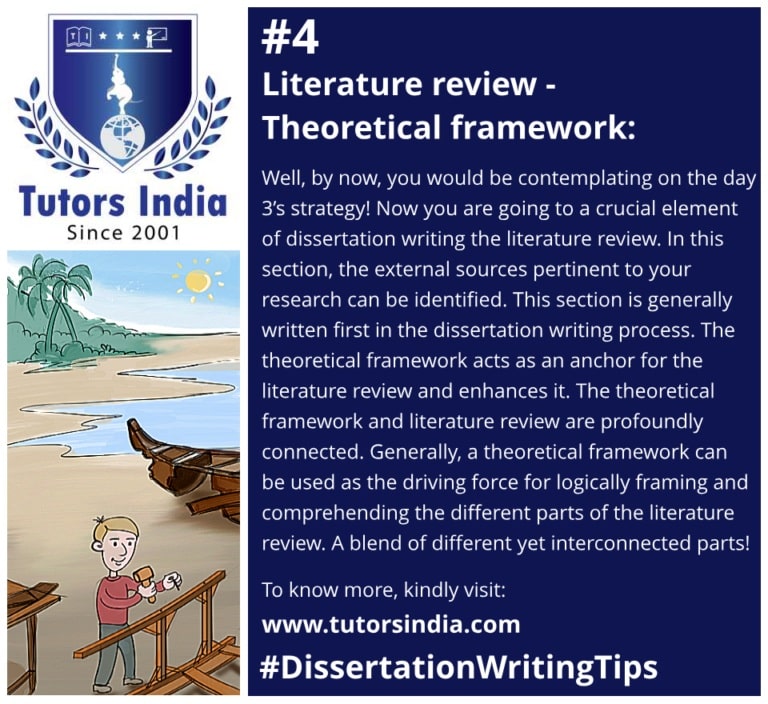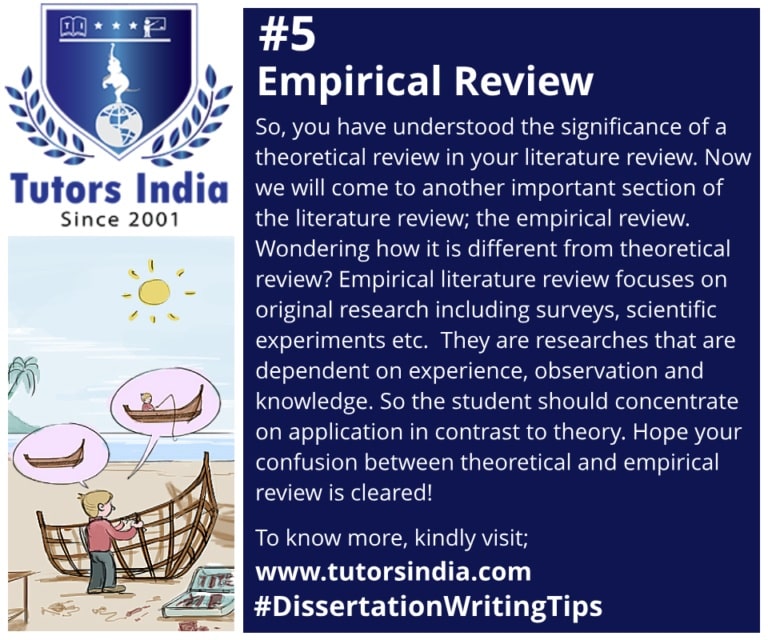Comprehending The Theoretical Framework and Empirical Framework in Dissertation Research
“A systematic and through the search of all types of published literature in order to identify as many items as possible that are relevant to a particular topic” (Gash, 2000, p.1)
Well, this is nothing but the literature review of a dissertation.
The scope of literature review
- Performing a diligent and exhaustive literature review is important when you write about research.
- The literature review examines what research has been performed in the past about your topic.
- It evaluates, brings into its scope, compares and contrasts, and finds relations between several scholarly materials.
- The literature review analyses research in your selected area to clear doubts about conceptual issues and also the empirical context of your project.
- Flick (2012) says that the literature review should deal with empirical literature about previous research in the field of your study.

Now let’s try to understand the theoretical framework of a literature review. The theoretical framework is a key element of the research process. However, the students doing Ph.D./Masters get confused. Well, let’s try to clear this misunderstanding. A theory-driven thinking is necessary for a solid literature review. It is related to the selection of an appropriate topic, the formation of the core element of the study-the research question, the design strategy, and the evaluation outline for the dissertation study.
Stuck up with the theoretical framework? Don’t worry!
For those of you who find it difficult to construe a theoretical framework, it’s the groundwork of all the essential knowledge.
- When you are reasoning out your study, the theoretical framework is useful.
- It supports the problem statement.
- It supports the research question.
So by now, we see that the theoretical framework supports three important parts of a dissertation. Once you have found out your problem statement and research question it is crucial to make out what theories exist for your selected subject. By doing so, you give a structure for your research and demonstrate that you are cognizant of the primary concepts and theories that are relevant to your topic.
“The point is not to summarize what has already been done in the field. Instead, it is to ground your proposed study in the relevant previous work and to give the reader a clear sense of your theoretical approach to the phenomena that you propose to study” (Maxwell (2005), p. 123)
Sinclair (2007) relates the theoretical framework to that of a map or travel plan. Grant and Osloo (2014) state that all factors of the dissertation research should relate to the theoretical framework.
The significance of theoretical literature review
The purpose of this element is to establish the theories that are already present, the interconnection between them, the extent of examination of the theories, and to formulate new hypotheses to be tested.
It becomes essential for the student to choose a theoretical framework right from the period the dissertation topic is conceptualized. The student’s choice of a theory gives the important structure to his/her dissertation.
Is the theoretical framework similar to the conceptual framework?
Theoretical frameworks are also confused as the conceptual framework. But the student should remember that these terms are not interchangeable. A theoretical framework is obtained from an existing theory in the literature. It has been tested and substantiated by others and is regarded as a generally accepted theory.
“It aids the researcher to identify and construct his/her worldview and approach to the topic of study (Grant & Osanloo, 2014).”
This is the definition given by Grant and Osanloo, 2014 for the conceptual framework.
The conceptual framework is the researcher’s comprehension of how the research problem will be studied, the particular direction the research will undergo, and the connection between the various variables in the study.

What is empirical research?
- Empirical research deals with testing a hypothesis with the help of experimentation, experience, and direct or indirect observation.
- Empirical research doesn’t rely on logic alone.
- Empirical data can be either quantitative or qualitative.
- When the researcher reviews empirical studies, he/she briefly outlines the earlier researches and demonstrates research gap by criticizing it.
- The empirical review delves into the research gap that is found in the previous researches.
- Empirical literature review is related to original research including surveys, scientific experiments etc.
- One can use the empirical review to justify some discussion based on the empirical result.
Overall, the literature review gives a connection with the past by interlinking the existing knowledge. It also goes a step further by pointing to the new direction for future.
We have to keep on learning and acknowledge the knowledge of researchers. But we should keep faith in our research skills and extend the limit of our knowledge in the process.
